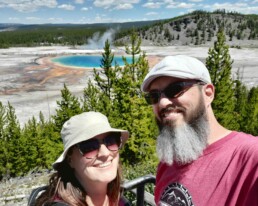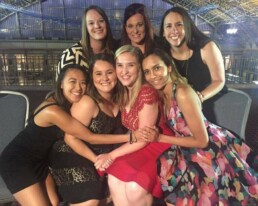Communication & Leadership with Amanda Dailey
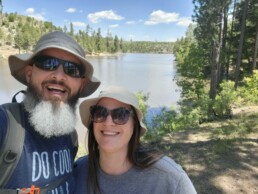
Originally from the northwest suburbs of Chicago, Amanda became a member of DPhiE at the University of Illinois-Chicago (Beta Rho Chapter) where she got her Bachelor of Arts in Communications. After graduation, she continued to be actively involved as an alumna volunteer serving as a regional chapter operations advisor, coordinating other chapter advisors and also a part of the Chicago alumnae association.
After moving to Phoenix, she was a part of the founding of the Phoenix alumnae association and assisted with the recruitment and founding of the Zeta Iota chapter at Northern Arizona University where she continues to serve on the Chapter Advisory Board as Programming Advisor. She also has served as a delegate, Collegiate Relations Chair, and is currently the Vice President for the Phoenix Alumnae Panhellenic Association.
Professionally, Amanda has over 20 years of experience in the non-profit sector. Working for the Boys and Girls Clubs, the Arthritis Foundation and in development for the University of Illinois Chicago she has honed skills in fund development and operations. She has been working in her current role at Teen Lifeline; an organization working to prevent teen suicide in Arizona through its crisis hotline, prevention education and community outreach; for over 10 years as Office Administrator responsible for accounting, board relations, employee recruitment, and human resource activities.
Amanda and her husband Adam love to travel, enjoying time in nature with their “big” pop-up camper “notoriously” named Gertie (if you know, you know), love a great concert, and snuggling on the couch with their two cats, Marley and Millie.
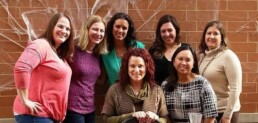
Tell me a little bit about yourself and your DPhiE journey. Why did you join? What was your experience like as an undergrad? What is it like now as an adult? Any favorite memories?
I joined DPhiE my freshman year. The University of Illinois-Chicago had a very small Greek system and DPhiE was one of only three NPC organizations. I went through formal recruitment and was not picked but I did have a strong connection with one DPhiE sister (who is still a close friend to this day, even stood up in her wedding) who later approached me for informal recruitment. I received a bid from there and the rest was history… as they say. I knew I loved DPhiE from the start… the values, the motto, even the mascot and colors (love unicorns and purple!). But, all kidding aside, my experience in DPhiE as an undergrad shaped me into the person I am today. I grew to love the philanthropic side, I gained invaluable leadership and social skills, and more self-confidence. I was very quiet, shy, and insecure in high school. As an adult, I now work in the non-profit sector and continue to educate collegiate women on programming and philanthropy both through advising and through my volunteer role in the Phoenix Alumnae Panhellenic Association. I have continued to gain great friendships as an alumna volunteer. It is truly amazing to be able to continue doing the things I love, connecting with youth and young adults through philanthropic work.
One of my favorite events as a collegian was going to Zephyr’s to eat large amounts of ice cream and sing songs with our new members. I was so sad when they closed down this Chicago icon. But probably my favorite memories are the silly ones that were not even associated with any particular event. To name a few quotes that would only be understood by my chapter sisters where ridiculousness ensued, “Feed the birds” “Pizza time, Pizza time”. I truly love my goofball sisters and would not have been happier with any other type of people over here “being rather than seeming to being”.
How has DPhiE helped you grow in your leadership skills, both professionally and personally?
So much of DPhiE and my experience has trickled into my professional and personal life. DPhiE gave me the strength to grow as a person by being actively involved in many positions around programming and philanthropy as well as being Treasurer. My choice of career today came from my experiences in DPhiE. It is the reason I decided to work in the non-profit community from my very first volunteer involvement with the Cystic Fibrosis Foundation, leading me to other roles in health-related non-profits, to higher education, and then to more grassroots organizations working with teens and young adults. I have worked in many roles, from fundraising to event planning, and eventually found my niche in administration/human resources management within the non-profit sector. I would say that DPhiE strengthened my social skills, bringing me out of my shell, giving me confidence as an individual, and creating the strong bonds of sisterhood that I not only hold with my DPhiE sisters but also my best girlfriends outside of DPhiE. I have found my greatest support system in the women I surround myself with.
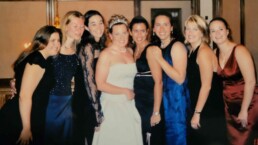
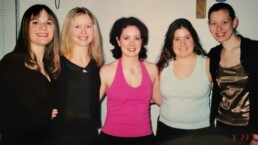
You are a shining example of one of our leadership competencies: communication. We define communication as “The ability to identify different styles of communication and adapt to various styles. The ability to exhibit active listening skills. The ability to deliver clear personal and professional messages..” How do you demonstrate communication in your life? Any specific examples?
Understanding is always something I think about when listening and communicating with everyone. I must say, even in situations where I may not necessarily agree, I will always ask questions and remain curious, looking for the “why”. If I know someone’s “why,” I can hopefully find a common ground and develop a better understanding of where they are coming from. I listen with compassion and actively listen by paraphrasing. “You just told me this about yourself, tell me more about why you feel that way.” Being someone who is in my mid-forties, I realize I do not always think the same way as a teen or a young adult. I think it is so important to realize that every generation thinks differently, and if you can just be curious, open-minded, and understanding, that is all anyone wants, to be heard and understood.
How has your experience in Delta Phi Epsilon grown your ability to communicate effectively with different audiences?
I think my ability to communicate well with different audiences has everything to do with our values: justice, sisterhood and love. Justice – treating everyone with respect regardless of background. Sisterhood – sharing a connection with people. Love – having compassionate relationships. I think about these things every time I communicate with anyone. Treat others with respect, try to find a connection, and approach them in a compassionate, caring way. While everyone might be different, if people approach communication from this standpoint, our world would be a much better place.
Can you provide an example of how you have inspired others to take action through communicating effectively?
“Understand before you assume, Listen before you speak, Think before you respond.” I read this quote somewhere (I wish I remembered where), and I thought… absolutely! There have been examples in my life where I have realized anger and aggression never get anyone anywhere. If you are unhappy and try to get your point across by attacking with anger, the other party will not respond well, whether that be by attacking back or feeling hurt. I’m not gonna lie, de-escalating a situation where someone is angry and the other person does not understand is probably one of the bigger challenges in life. Going back to the quote from above, the best way for people to get past this disconnect is to try to understand, listen with compassion, and think about what you are trying to communicate.
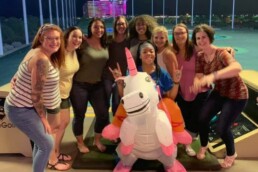
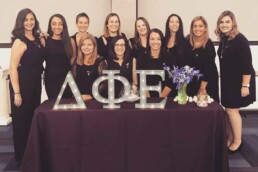
How do you balance assertiveness with empathy when communicating during a difficult situation?
Being assertive comes with a bit of hard honesty and expressing empathy shows that you do care. I like to call this the “I love you, but” way of communicating. “I am sorry that you are having a rough time, but maybe I am too and you are discounting my feelings at the expense of your own.” Communicating in this way can most definitely be hard and does require a bit of strength and a sense of self. Attempting to educate the other person on your honest feelings is often hard, especially if you feel like you might be hurting theirs in return.
How do you foster open and transparent communication within your volunteer role at DPhiE and in your professional career?
My career is focused on human resources, and with that, I remain curious about the human experience. “What’s going on? Is everything okay? How can I help you with your concerns?” I try to be as open and honest about how things operate, how things work, and what I can do to assist. In return, I try to form a connection to what is being expressed, give them the respect to share their story and find a common ground in which to understand. All of this is exhibited both within my volunteer role as an advisor and in my role as a human resources professional.
How do you continually seek feedback and strive to improve your communication skills within the organization and outside of it?
I am probably one of those strange people who loves a performance review and wants to know what her peers think about her. I am continually curious not only about life around me but how others see me as well. Sometimes it’s tough to hear, but once I think about what has been expressed to me, I can strive to move forward and work to improve. In that regard, I like to always be thoughtful of others… their feelings, what is going on in their lives, etc. Again, listen, understand, and always be curious.
